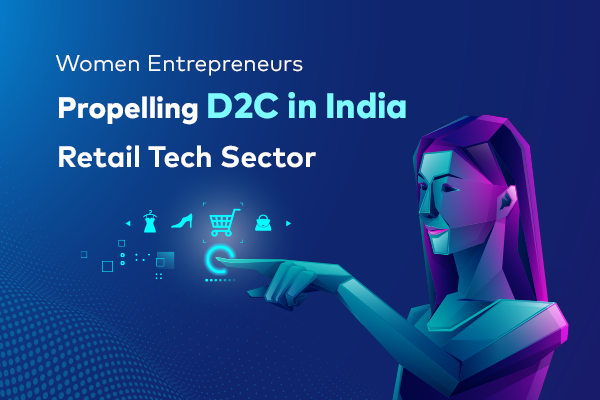

Women Entrepreneurs Propelling D2C in India
The Direct to Consumer (D2C or DTC) sector in India has seen tremendous growth over the last decade. This growth has been propelled by the startups and innovators who have incorporated the D2C model into their ventures spanning various sectors. Among these, the top 3 sectors that have seen the highest number of D2C startups are Personal and Home Care, Food and Beverages, and Fashion. [1] Among the multiple factors that have contributed to the growth of D2C in India, the developing digital infrastructure and internet penetration, along with a shift in consumer preferences, are the key drivers of this growth.
The rise of several D2C companies that were founded up to ten to fifteen years back, such as Lenskart, Zivame, Caratlane, and Pepperfry, has inspired more entrepreneurs to follow suit by innovating across sectors and directly catering to a growing number of consumers across the country.
Today, major D2C unicorns in India include Licious, Mamaearth, and GoodGlamm Group. Two out of these three unicorns, i.e., Good Glamm Group and Mamaearth are co-founded and led by women. Given that only 18 out of the 108 Indian unicorns are co-founded and led by women, the D2C space showcases potential for promising female founders. The growth of women entrepreneurs in the D2C space is not just reflected in the number of unicorns, but also in the overall number of startups emerging in the country. As per the data from Department for Promotion of Industry and Internal Trade (DPIIT) on 15th May 2023, the number of women-led startups [2] in the top 3 D2C sectors i.e., in Personal and Home Care, Food and Beverages, and Fashion, is 3644, which is ~52% of all startups in these sectors. Women-led startups in these key D2C sectors have seen a growth of more than 2700% from 130 in 2017 to 3644 in May 2023.
33% of these startups i.e., more than 1200 women-led startups in these key D2C sectors emerged during the period of COVID-19 in 2020 and 2021. This is supported by the increased amount of time that consumers spent shopping online, which ultimately led to a significant shift in consumers’ demand for products from customised, smaller, home-grown brands.
Easier access to the internet and consumer experience through E-Commerce sites over the last 10 years has enabled several women, both homemakers and salaried professionals, to start their ventures with an online presence. Given the flexibility that the internet has provided, women find it easier to start a venture at a relatively smaller scale with lesser amount of funds and easier logistics, with no warehousing facilities or middlemen involved. Hence, with lesser risk involved in starting a business, it also enables these female founders to have the option of scaling it up at a later stage at their pace.
Emerging D2C startups are creating communities and content for their consumers that focus on the problem statements that the startups are solving, which are often gender focused. For instance, women-led startups such as Good Glamm Group, SUGAR Cosmetics, and Nykaa engage extensively through community and content initiatives. The Good Communities, by the Good Glamm Group, is the first initiative globally by a conglomerate to build the world’s largest deep-interest communities and has 2 million+ parents in their community under the brand BabyChakra. Similarly, the Nykaa Network has created a community that enables its members to post questions and interact among themselves, further creating brand loyalty. This, in addition to the customisation, personal touch, and trust that comes with operating in the D2C segment, makes such key sectors increasingly promising to aspiring female founders.
Maharashtra, Karnataka, Delhi, Uttar Pradesh, and Gujarat are the states with the highest number of such women-led startups in key D2C sectors, further showcasing the contribution of the growing digital infrastructure in these states in enabling more women to become D2C startup founders. 1700+ startups i.e., 47% of all women-led startups from these sectors also come from Tier-2 and Tier-3 cities, which is a testament to women entrepreneurs across the country becoming a part of the workforce through founding D2C businesses.
With the Indian D2C market being anticipated to grow to US$60 billion by FY27[3], and the number of women entrepreneurs in India growing every year, the opportunity for women founders to be at the forefront of India’s D2C Revolution is unprecedented.
[1] Data – Department for Promotion of Industry and Internal Trade (DPIIT)
[2] Startups with atleast 1 Woman Director
[3] India D2C Report 2022 by Confederation of Indian Industry

